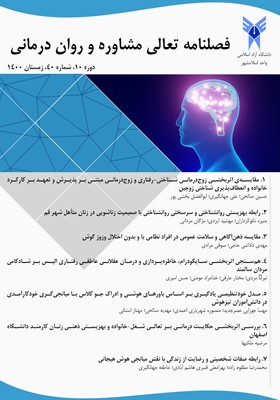رابطه بهزیستی روانشناختی و سرسختی روانشناختی با صمیمیت زناشویی در زنان متأهل شهر قم
محورهای موضوعی : فصلنامه تعالی مشاوره و روان درمانیمنیره نکوکرداران 1 , مهشید ایزدی 2 * , مژگان مردانی 3
1 - کارشناس ارشد، گروه روانشناسی، واحد تهران مرکزی، دانشگاه آزاد اسلامی، تهران، ایران.
2 - استادیار، گروه روانشناسی، واحد تهران مرکزی، دانشگاه آزاد اسلامی، تهران، ایران.
3 - استادیار، گروه روانشناسی، واحد تهران مرکزی، دانشگاه آزاد اسلامی، تهران، ایران.
کلید واژه: بهزیستی روانشناختی, زنان متأهل, صمیمیت زناشویی, سرسختی روانشناختی,
چکیده مقاله :
هدف: صمیمیت زناشویی نقش مهمی در استحکام خانواده دارد. بنابراین، هدف این پژوهش بررسی رابطه بهزیستی روانشناختی و سرسختی روانشناختی با صمیمیت زناشویی در زنان متأهل بود.روش: مطالعه حاضر مقطعی از نوع همبستگی بود. جامعه پژوهش زنان متأهل مراجعهکننده به مرکز مشاوره صدرا در شهر قم در سال 1399 به تعداد 240 نفر بودند. طبق فرمول کوکران حجم نمونه 144 نفر برآورد که با روش نمونهگیری تصادفی ساده انتخاب شدند. ابزارهای پژوهش مقیاسهای بهزیستی روانشناختی (ریف، 1989)، سرسختی روانشناختی (لانگ، گولت و امسل، 2003) و صمیمیت زناشویی (والکر و تامپسون، 1983) بودند. دادهها با روشهای ضرایب همبستگی پیرسون و رگرسیون چندگانه با مدل همزمان در نرمافزار SPSS-21 تحلیل شدند.یافتهها: یافتهها نشان داد که بهزیستی روانشناختی (و هر شش مولفه آن شامل پذیرش خود، رابطه مثبت با دیگران، خودمختاری، تسلط بر محیط، زندگی هدفمند و رشد فردی) و سرسختی روانشناختی (و هر سه مولفه آن شامل کنترل، تعهد و چالشجویی) با صمیمیت زناشویی در زنان متأهل رابطه مثبت و معنادار داشتند(001/0˂P) همچنین، متغیرهای بهزیستی روانشناختی و سرسختی روانشناختی بهطورمعناداری توانستند 53 درصد، شش مولفه بهزیستی روانشناختی بهطورمعناداری توانستند 67 درصد و سه مولفه سرسختی روانشناختی بهطورمعناداری توانستند 37 درصد از تغییرات صمیمیت زناشویی در زنان متأهل را تبیین کنند(001/0˂P)نتیجهگیری: نتایج نشاندهنده رابطه مثبت معنادار بهزیستی روانشناختی و سرسختی روانشناختی با صمیمیت زناشویی در زنان متأهل و نقش آنها در تبیین صمیمیت زناشویی آنان بود. بنابراین، برای ارتقای صمیمیت زناشویی میتوان بهزیستی روانشناختی و سرسختی روانشناختی را بهبود بخشید.
Purpose: Marital intimacy plays an important role in family strength. Therefore, the aim of this study was investigate the relationship between psychological well-being and psychological hardiness with marital intimacy in married women.Methodology: The present study was cross-sectional from type of correlation. The research population was married women who referred to Sadra counseling center in Qom city in 2020 year with number of 240 people. According to Cochran's formula, the sample size was estimated 144 people who were selected by simple random sampling method. The research instruments were the scales of psychological well-being (Ryff, 1989), psychological hardiness (Lang, Goulet and Amsel, 2003) and marital intimacy (Walker and Thompson, 1983). Data were analyzed by methods of Pearson correlation coefficients and multiple regression with enter model in SPSS-21 software.Findings: The findings showed that psychological well-being (and all six components including self-acceptance, positive relationships with others, autonomy, environment mastery, purpose in life and personal growth) and psychological hardiness (and all three components including control, commitment and challenge) had a positive and significant relationship with marital intimacy in married women (P˂0.001). Also, the variables of psychological well-being and psychological hardiness significantly able to explained 53%, six components of psychological well-being significantly able to explained 67% and three components of psychological hardiness significantly able to explained 37% of the changes of marital intimacy in married women (P˂0.001).Conclusion: The results indicated the positive and significant relationship of psychological well-being and psychological hardiness with marital intimacy in married women and their role in explaining their marital intimacy. Therefore, to promote marital intimacy can be improved the psychological well-being and psychological hardiness
_||_

